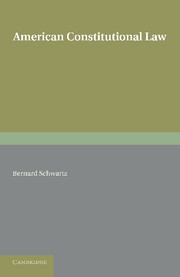Book contents
- Frontmatter
- Dedication
- Contents
- Foreword
- Preface
- PART I THE STRUCTURE
- Chapter I The Bases of the American System
- Chapter II The Federal System
- Chapter III The Congress
- Chapter IV The President
- Chapter V The Courts
- PART II MODERN DEVELOPMENTS
- Appendix: Constitution of the United States of America
- Index of Cases
- General Index
Chapter IV - The President
from PART I - THE STRUCTURE
Published online by Cambridge University Press: 05 June 2016
- Frontmatter
- Dedication
- Contents
- Foreword
- Preface
- PART I THE STRUCTURE
- Chapter I The Bases of the American System
- Chapter II The Federal System
- Chapter III The Congress
- Chapter IV The President
- Chapter V The Courts
- PART II MODERN DEVELOPMENTS
- Appendix: Constitution of the United States of America
- Index of Cases
- General Index
Summary
‘What is the best constitution for the executive department,’ states the most famous of Commentaries upon the American Constitution, ‘and what are the powers, with which it should be entrusted, are problems among the most important, and probably the most difficult to be satisfactorily solved, of all which are involved in the theory of free governments…. No man, who has ever deeply read the human history, and especially the history of republics, but has been struck with the consciousness, how little has been hitherto done to establish a safe depositary of power in any hands; and how often in the hands of one, or a few, or many, of an hereditary monarch, or an elective chief, the executive power has brought ruin upon the state, or sunk under the oppressive burden of its own imbecility.’
There appears to be little doubt but that the framers of the American Constitution were strongly influenced by sentiments such as those which moved the author of this passage. In dealing with the organization of the national executive, the Convention of 1787, which drew up the American organic instrument, was well aware of the dilemma which confronted it. ‘The majority of the Framers ardently desired to provide an executive power which should be capable of penetrating to the remotest parts of the Union, not only for the purpose of enforcing the national laws, but also… for the purpose of bringing assistance to the states in grave emergencies of domestic disorders. At the same time, most of them recognized that it was absolutely indispensable that the Convention should avoid stirring up the widespread popular fear of monarchy. Nor did the vast size of the country and the difficulties of travel and transportation make the problem any easier of solution. How could a political force be provided that would be sufficient to overcome these natural obstacles and yet be safe—or at least thought safe—from the point of view of popular liberty?’
- Type
- Chapter
- Information
- American Constitutional Law , pp. 85 - 124Publisher: Cambridge University PressPrint publication year: 2013



